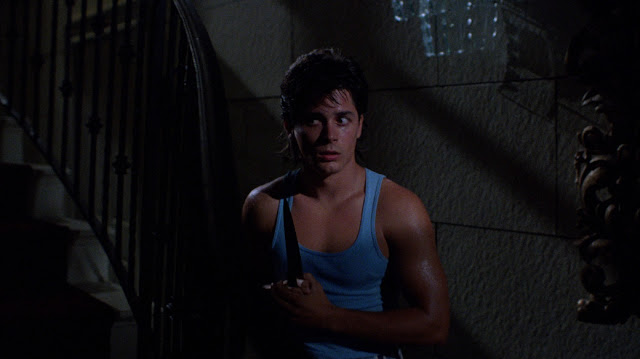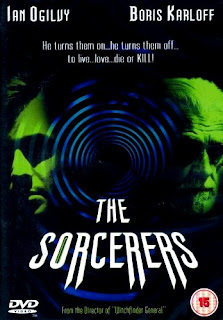Society (1989)
The 1980s were a great time for horror cinema. The emergence of ground-breaking make-up and special effects work enabled filmmakers to depict unimaginable horrors in ways never possible before. When effects were used to enhance gripping stories, the results were frequently memorable and powerful. The likes of An American Werewolf in London (1981) and The Thing (1982), with their astounding depictions of lycanthropic transformations and unspeakable terrors from beyond the stars, respectively, thrust audiences headfirst into all manner of visceral, eye-popping imagery. Brian Yuzna’s satirical body-horror Society is another of these titles. It tells of a teenager who begins to suspect his wealthy family are part of a mysterious elite cult and have dubious intentions for him. As the story unfolds, we’re given hints here and there of the weird, almost otherworldly nature of the cult and its members, before it is finally revealed at the jaw-dropping climax in all its gory, body-melting glory – courtesy of astonishing special make-up effects by Screaming Mad George.
‘Some people make the rules, some people follow the rules. It’s a question of what you’re born into.’
While the special effects are indeed a sight to behold, Yuzna doesn’t need to overly rely on them - until the climax we're only afforded glimpses: an oddly contorted body here, a weird, pulsating mound of flesh there. Rife with themes such as alienation, paranoia, class, hereditary privilege and social status, there’s a lot going on beneath (and above!) the surface of Society. Intrigue is established from the off and after the queasy opening credits, Yuzna layers on the tension as Bill (Billy Warlock) notices increasingly odd and eventually alarming things about his family. Like many teenagers, Bill feels like he doesn’t fit in, that his family view him with thinly veiled contempt, and that his friends are only hanging out with him for their own gain. Dialogue is peppered with seemingly throwaway lines that harbour subtle threats and insinuations, especially in the moments when various characters tell Bill that he is going to make a ‘great contribution’ to society. Bill discovers that his whole life has been a lie. His home becomes a hunting ground, and his family and friends, dangerous strangers. The screenplay (courtesy of Woody Keith and Rick Fry) taps into dark fears of peer ostracization and familial betrayal and abandonment, while taking satirical swipes at capitalist, upper-class society and the prejudiced attitudes it produces and perpetuates.
Bill confides in his therapist that he suspects most of the people in his life are all conspiring against him and share a dark secret. Much later, when the full horror of what his family are part of is revealed, Bill is told by them ‘You’re a different race from us, a different species, a different class. You’re not one of us.’ The power of Yuzna’s film lies in its depiction of a highly privileged older generation not only feeding (figuratively, and quite literally) on younger generations and on those they deem to be ‘beneath’ them, but also in the vile views and prejudices they perpetuate, as evidenced in the revelation that several of Bill’s classmates and his own sister are part of this exclusive collective. They were born into it. The notion that a small percentage of society, the 1%, an elite upper class, exploiting and feeding off the rest of us to amass wealth and influence, remains as strongly prevalent today as it did in the 1980s. As one character splutters: ‘The rich have always sucked off low class shit like you.’ Their wealth and social standing enable this group to do whatever they want, without repercussion or consequence, and it’s revealed they have done so throughout history, with a lineage that dates to Julius Caesar and Genghis Khan. This has particularly chilling implications with the utterance of the film’s last line - ‘You’ll never get away with this’ – suggesting that those who can afford to, can get whatever they want sooner or later.
During the climax – and the big reveal – all is plunged further into nightmarish territory with livid lighting and gruesome body-horror as the guests undress and appear to melt together in a horrific orgy, eventually ingesting Bill’s sister’s ex-boyfriend. The special effects and make-up leave nothing to the imagination as bodies writhe, undulate, glisten and sickeningly melt into each other to form a moistly pulsating jigsaw of flesh.
What makes Society so great is that it has something interesting - and still very relevant - to say about society, class and social injustice. As the film’s tagline states: The rich have always fed off the poor. The astounding imagery throughout – particularly in the unforgettable denouement - isn’t just for shock value (though it is very shocking!), it works to enhance the films themes of class inequality, hereditary privilege, paranoia and alienation. It has a wicked sense of humour, especially in its satire of the artificiality of upper-class society, and boasts utterly surreal, outrageous imagery dredged up from the very darkest crevices of the subconscious.




